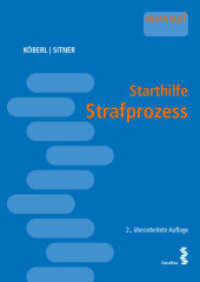Full Description
At last, a practical guide to the what, how, when, and where of effective assessment!
When determining whether or not a student should receive special education services, what the specific nature of the student's instruction should be, or the extent to which a student is making educational progress, it is critical to know not only what sort of assessment method is most appropriate, but how, when, and where it should be administered.
Including a pretest, posttest, and key vocabulary terms, Effective Assessment for Students With Special Needs helps educators make these weighty decisions with highly practical information such as:
Formal and informal methods of data collection
When to use various assessment practices and what they can show an evaluator
Standards for conducting assessments to ensure accuracy
Using data to make decisions about the education of students with disabilities and those who are gifted and talented
Contents
About A Practical Approach to Special Education for Every Teacher
Acknowledgements
About the Authors
Self-Assessment I
Introduction to Effective Assessment for Students With Special Needs
1. What Should Every Teacher Know About Assessment for Decision-Making Purposes?
Screening Decisions
Decisions to Provide Special Help or Enrichment
Referral to an Intervention Assistance Team
Decisions to Provide Intervention Assistance
Decisions to Refer for Evaluation
Exceptionality Decisions
Decisions About Special Learning Needs
Decisions About Eligibility or Entitlement
Instructional Planning Decisions
Progress Evaluation Decisions
Program Evaluation Decisions
Accountability Decisions
2. What Are the Most Common Assessment Practices?
Curriculum-Based Assessment
Curriculum-Based Measurement
Instructional Diagnosis
Academic Time Analysis
Assessment of Instructional Environments
Outcomes-Based Accountability
Performance Assessment
3. How Is Assessment Data Collected?
Methods for Collecting Data
Tests
Observations
Interviews
Work Portfolios
4. Which Methods of Assessment Should Be Use to Sample Certain Behaviors and Abilities?
Intellectual Ability
Academic Achievement
Sensory Acuity
Adaptive Behavior
Language Development
Psychological Development
Perceptual-Motor Development
5. What Standards Must Be Met To Ensure the Accuracy of an Assessment?
Reliability: Is Performance Consistent?
Representativeness: Does the Instrument Adequately Sample the Behavior?
Validity: Does a Procedure Measure What it is Supposed to Measure?
6. What Concerns Do Parents, Students, and the General Public Have About Assessments?
Test Fairness
Acceptability
Consequences
7. What Are the Assumptions Underlying Assessment Practices?
The Examiner is Skilled
Future Behavior Can Be Inferred From Present Behavior
Assessment Is Relatively Free From Error
Students Have Comparable Acculturation
8. What Guidelines Should Be Followed for Appropriate Assessment?
There Is No One Way To Do It Right
There Is No One Cause of School Problems
Assessment Must Do More Than Describe Problems
Assessment Must Be Directed At Improving Instruction
Assessment Should Occur Often During Teaching
Assessment Should Concentrate on Relevant Variables
Assessment Should Occur Where The Behavior Occurs
Tests Should Be Adapted To Accommodate Students
9. Assessment in Perspective
Assessment in the Classroom
The Effects of Assessment
10. What Have We Learned?
Key Points
Key Vocabulary
Self-Assessment II
Answer Key for Self-Assessments
On Your Own
Resources
Books
Journals & Articles
Organizations
References
Index








